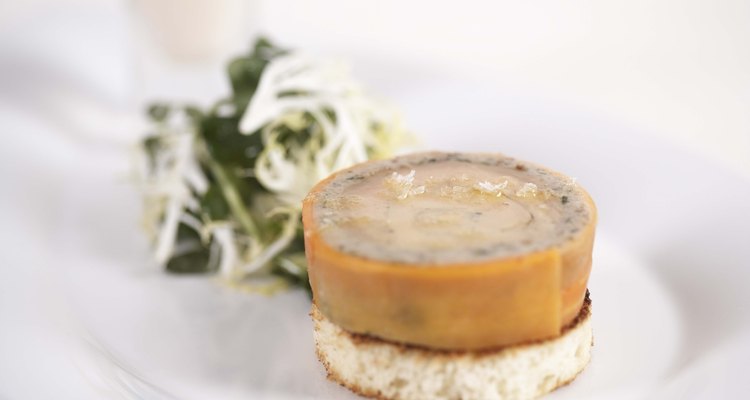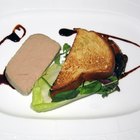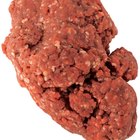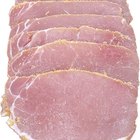
Jupiterimages/Stockbyte/Getty Images
Literally meaning "fat liver," the French pate delicacy foie gras comes from the plump livers of force-fed ducks or geese. While most foie gras is cooked and cured before sale, you can buy foie gras in raw chunks known as lobes. If you buy foie gras raw, be sure to cook it before eating. Note that at the time of publication, foie gras was banned in California due to the controversial method of production.
The Raw Truth
Raw foie gras, sometimes called foie gras cru, is usually sold as a whole bird's liver, or in a few large pieces. Often, it's a lower grade than cured foie gras, with a red veins running through the liver. This raw, unrefined foie gras is never eaten without some form of curing or cooking. Chefs might use raw foie gras to make sauces, or they prepare the raw liver and cure it into a more refined pate.
Finding the Cure
The curing process for foie gras involves mixing the liver with salt and other seasoning, wrapping the pate in tight cloth, and hanging for several days in a cool pantry or refrigerator. After hanging, the liver is poached in water or light stock to cook the cured pate. Duck liver generally has the stronger taste, while foie gras made from geese has a more subtle flavor.
Better Off Poached
Great chefs aim for a rich, smooth foie gras with no color variations. If you're preparing your own raw foie gras, be sure to pick out the veins with tweezers and a flat knife. Left in, these veins cause changes in color and consistency. Roll foie gras into a firm sausage shape using a bamboo sushi mat and plastic wrap. Some recipes suggest poaching the pate at temperatures of 140 degrees Fahrenheit and lower. However, to make sure the foie gras is safe to eat, aim to get the internal temperature to 160 degrees F before the poaching ends.
Foie Gras Safety
Raw foie gras will keep safely in a refrigerator set between 32 and 39.2 degrees Fahrenheit, according to "Foie Gras" Magazine. However, even when cured and cooked, foie gras can pose health risks to vulnerable people. The FoodSafety.gov website lists meat pastes and pates such as foie gras as leading sources of listeria poisoning. Eating raw or badly stored foie gras increases the risk significantly. In particular, pregnant women and older people should avoid foie gras altogether.
Related Articles

How to Keep Thawed Liver Before Cooking ...

When Does Salami Spoil?

Dangers of Spoiled Ground Beef

How to Sugar Cure Bacon

How Long Does It Take for Pork to Spoil ...

Can I Eat Pork That Smells Bad if I ...

How to Boil Beetroot

How Long Can Raw Meat Sit Out?

How Long Will Dry Salami Last if Not ...

How to Know if Bacon Has Gone Bad

Can You Fry Frozen Tilapia?

How Long Should Beef Liver Be Cooked?

How to Know if Marinated Steak Is Bad

How to Cook Deer Bologna With a Smoker

Extracting Bone Marrow for Cooking

How to Devein Tiger Prawns

How to Fry Liver

What Does It Mean When Hamburger Smells ...

How Do I Tell If Pork Has Turned Bad?

How Long Is Cooked Chicken Good?
References
Writer Bio
Based near London, U.K., Peter Mitchell has been a journalist and copywriter for over eight years. Credits include stories for "The Guardian" and the BBC. Mitchell is an experienced player and coach for basketball and soccer teams, and has written articles on nutrition, health and fitness. He has a First Class Bachelor of Arts (Hons.) from Bristol University.
Photo Credits
Jupiterimages/Stockbyte/Getty Images